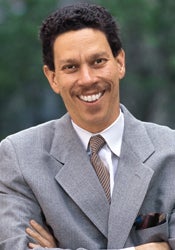Today’s edition of USA Today includes an op-ed by HLS Professor David B. Wilkins ’80, “USDA official victim of ‘high-tech lynching,’” on the firing of U.S. Department of Agriculture official Shirley Sherrod. Wilkins is the Lester Kissel Professor of Law at Harvard and the director of the Program on the Legal Profession.
During his confirmation hearings for a seat on the U.S. Supreme Court in 1991, Clarence Thomas famously described the news media’s treatment of the allegations that he had sexually harassed a young female co-worker during his tenure as head of the Equal Employment Opportunity Commission as a “high-tech lynching.”
In Thomas’ case, the claim was little more than clever hyperbole. In the case of what has just been done to fired U.S. Department of Agriculture official Shirley Sherrod, it is true — and especially poignant since as she makes clear at the beginning of her grotesquely misquoted speech, Sherrod is all too familiar with the good old-fashioned low-tech variety.
We now know that the caricature of Sherrod as a blatant racist who intentionally failed to assist a poor white farmer solely because of his race painted by right-wing blogger Andrew Breitbart and his enablers on Fox News— and sadly swallowed whole by no less than the NAACP and Secretary of Agriculture Tom Vilsack— is patently false. To the contrary, the entire point of her speech was to underscore, as she repeatedly says, that “the struggle is really about poor people,” and about how the system works almost as poorly for poor whites as it does for poor blacks.
It is only after explicitly making this point that Sherrod recounts her 20-year-old story about a white farmer to whom at first she felt obliged to give only minimal assistance, assuming that the system would take care of his claim. But when she realized that this person, who she assumed came from a position of privilege simply because of his race, was about to slip through a crack in the regulations designed to prevent people like him from foreclosure — and that the white lawyer she had assumed would handle his problem was doing nothing to help — Sherrod jumps into action “calling everyone” to help save the farmer’s land. The lesson, Sherrod tells the NAACP audience, is simple: “God helped me to see that it is not about black people but about poor people,” and that “we have to work together” to “overcome the divisions we have.” Hardly the words of a flagrant racist.
Read full article here.
